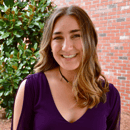What does queer feminism mean to you?
Queer feminism to me is the intersectionality between my identity as a woman and as a feminist and also my identity as a queer college student.
When did you first discover queer feminism?
So queer feminism was kind of first brought up to me in my current Women’s, Gender, & Sexuality Studies (WGSS) Current Controversies in Modern Feminism class. It goes off of how there are so many different waves of feminism and different types of feminism and how the modern feminism movement is more inclusive, but how many past feminist movements really just focus on white straight women. [The current movement is about] changing the heteronormativity of relationships and of women in the house and in the workplace. That very often did not include black women or any women of color, and issues that queer women face – as well as women of color – were ignored by the modern movements. [It’s] kind of just bringing a highlight to queer issues in the modern feminist movement. That’s what queer feminism is to me and is to, I think, many other queer women.
How do you think your WGSS minor and the classes you’ve taken at Elon impacted how you view feminism and the world?
I think it allows me to critique feminism more than just taking it at face value. Also it shaped my identity as being able to educate myself in a way that I feel comfortable speaking out about things and speaking up for women and queer women and people in general. I’m not forcing them to have a voice but giving my own opinions to create a conversation instead of just pushing things under the rug or just ignoring issues that people are facing. It’s just making people confront something that they’re not really comfortable with and not used to.
Is it difficult to have those conversations?
I think yeah, especially when you’re friends with people who have different values and ideals or beliefs, confronting that and almost putting your friendships on the line because of that. Especially in college where everyone comes from different backgrounds. But it’s also being confident enough in yourself and your identity and what you believe to have those difficult conversations that need to be had.
So how do you think you view yourself differently from before you even discovered queer feminism to now?
I think a lot of it had to do with accepting myself and accepting how I identify and that whole process, which took most of my life up to this point…I think once I accepted myself I didn’t have to force myself to be someone who I thought I was, who I wasn’t. It was very freeing and very powerful. I’m very passionate about feminism and now very passionate about queer theory and the intersection of both of them coming together as one identity. I’m just passionate about that. A lot of my identity is fighting and learning and being the person I want to be based on what I’ve learned through queer feminist theory.
Is there anything you want me to know or you want other people to know that you want me to put in this article?
I think something I want people to know is that you don’t have to be completely certain in your identity or in yourself to speak up about whatever your opinions are. Giving a voice to yourself and your opinions is very important. I think a lot of people just hide behind not having opinions and that’s a big privilege that people have that they don’t realize. Not being involved in politics means that it doesn’t affect you in a way whereas people who are more marginalized or more disadvantaged have to pay attention to it because it directly affects them and this is what they depend upon. That’s the same with feminism or any theory, really. Just have your opinions and wear them proud because you need to stand for something more than yourself.
Visit Elon’s Gender & LGBTQIA Center in Moseley 211. Read more about queer feminism here.


